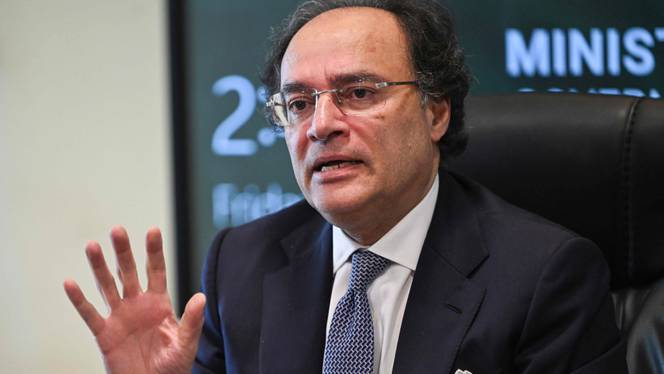Finance Minister Muhammad Aurangzeb, without specifying how much the nation is trying to secure, tells us if the loan is approved, Islamabad would revisit its NFC award that allocates revenues between the federation and the provinces.
Washington DC — Pakistan is requesting a “larger and longer” multi-billion-dollar loan programme from the International Monetary Fund [IMF] and discussions are underway with the Fund’s officials, the country’s Finance Minister Muhammad Aurangzeb said, without specifying how much the nation was trying to secure.
Aurangzeb, who is in the US capital with his team to participate in the IMF and World Bank’s meetings and request new financial package, said once the mission is back in Islamabad “we are going to agree on the priorities and the principles.”
“I believe it is Pakistan’s programme. It’s not an IMF programme. It’s a Pakistan’s programme and it is supported, assisted, and funded by the IMF. What’s the size, and the reality and where we are, it’s premature to talk about that. We have our own views we’ll share with them [IMF]. But I would rather leave it to the joint meetings in terms of the size and the duration of the programme,” Aurangzeb told a group of journalists and think-tanks.
Asked by us if Islamabad would revisit its National Finance Commission [NFC] award — the allocation of revenues between the federation and the provinces — once IMF approves the new loan programme, Aurangzeb said “Pakistan needs to review it in the context of 18th amendment where a lot of stuff has been devolved to the provinces.”
“It is a discussion which we will have with the provinces… in terms of either expenditure sharing or requesting them to incentivise to bring up the tax base, because the reality is, after the 18th amendment and the NFC award, some of the sectors which need to be brought in a much bigger way into the tax net are actually provincial markets,” he said.
“Whether it’s agriculture, real estate, property construction, we can help support systems, but it is for them to actually go ahead and do it,” Aurangzeb said, adding he has already engaged with the chief ministers of Punjab and Sind provinces with respect to starting the dialogue.
Pakistan signed a short-term agreement with IMF in 2023 to overcome the economic crisis that had raised fears the South Asian nation could default on paying foreign debts. Pakistan is reportedly seeking a new bailout of up to $8 billion when the current one of $3 billion expires.
The Pakistani finance minister’s visit to US comes as IMF published its updated World Economic Outlook that shows Pakistan will grow at 2 percent and face 25 percent inflation. The IMF has kept the country’s growth rate at 3.5 percent for the next fiscal year.
Aurangzeb, meanwhile, ruled out any further significant rupee devaluation.
Speaking at roundtable meeting with Bloomberg team in Washington on Thursday, he said Pakistan’s solid reserves, stable currency, and growing exports support against rupee devaluation.
Aurangzeb said his country is ramping up support for industries, agriculture, and IT to boost national growth above four percent in the coming years.









